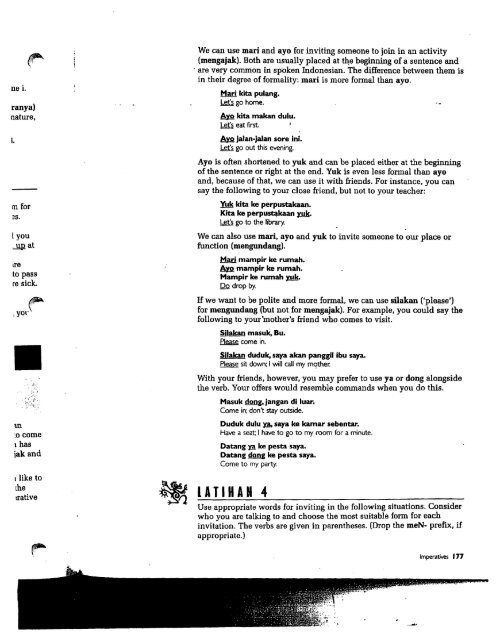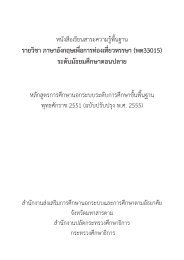bahasa indonesia
djenar-2003-a-students-guide-to-indonesian-grammar-oxford
djenar-2003-a-students-guide-to-indonesian-grammar-oxford
- No tags were found...
You also want an ePaper? Increase the reach of your titles
YUMPU automatically turns print PDFs into web optimized ePapers that Google loves.
anya)<br />
nature,<br />
m for<br />
3s.<br />
1 you<br />
UP at<br />
ve<br />
to pass<br />
re sick.<br />
3n<br />
:O come<br />
1 has<br />
iak and<br />
1 like to<br />
ihe<br />
trative<br />
We can use mari and ayo for inviting someone to join in an activity<br />
(mengajak). Both are usually placed at the beginning of a sentence and<br />
are very common in spoken Indonesian. The difference between them is<br />
in their degree of formality: mari is more formal than ayo.<br />
Mari kita pulang.<br />
Let's go home. - - -<br />
&Q kifa makan dulu.<br />
Let's eat first.<br />
I<br />
-<br />
&Q jalan-jalan sore ini.<br />
Letf go out this evening.<br />
Ayo is often shortened to yuk and can be placed either at the beginning<br />
of the sentence or right at the end. Yuk is even less formal than ayo<br />
and, because of that, we can use it with friends. For instance, you can<br />
say the following to your close friend, but not to your teacher:<br />
-<br />
Yuk kita ke perpustakaan.<br />
Kita ke perpu-n a.<br />
Let's go to the library.<br />
-<br />
We can also use mari, ayo and yuk to invite someone to our place or<br />
function [mengundang) .<br />
Mari mampir ke rumah.<br />
mampb ke rumah.<br />
Mampir ke rumah mk.<br />
drop by.<br />
If we want to be polite and more formal, we can use silakan ('please')<br />
for mengundang (but not for mengajak). For example, you could say the<br />
following to your'mother's friend who comes to visit.<br />
Silakan masuk, Bu.<br />
Please come in.<br />
Silakan duduk, saya akan panggil ibu saya<br />
Please sit down; I will call my mother.<br />
With your friends, however, you may prefer to use ya or dong alongside<br />
the verb. Your offers would resemble commands when you do this.<br />
Masuk dong, jangan di luar.<br />
Come in; don't stay outside.<br />
Duduk dulu saya ke kamar sebentar.<br />
Have a seat; I have to go to my room for a minute.<br />
Datang ya ke pesta saya.<br />
Datang dona ke pesta saya.<br />
Come to my party.<br />
Use appropriate words for inviting in the following situations. Consider<br />
who you are talking to and choose the most suitable form for each<br />
invitation. The verbs are given in parentheses. (Drop the meN- prefix, if<br />
appropriate.)<br />
'



